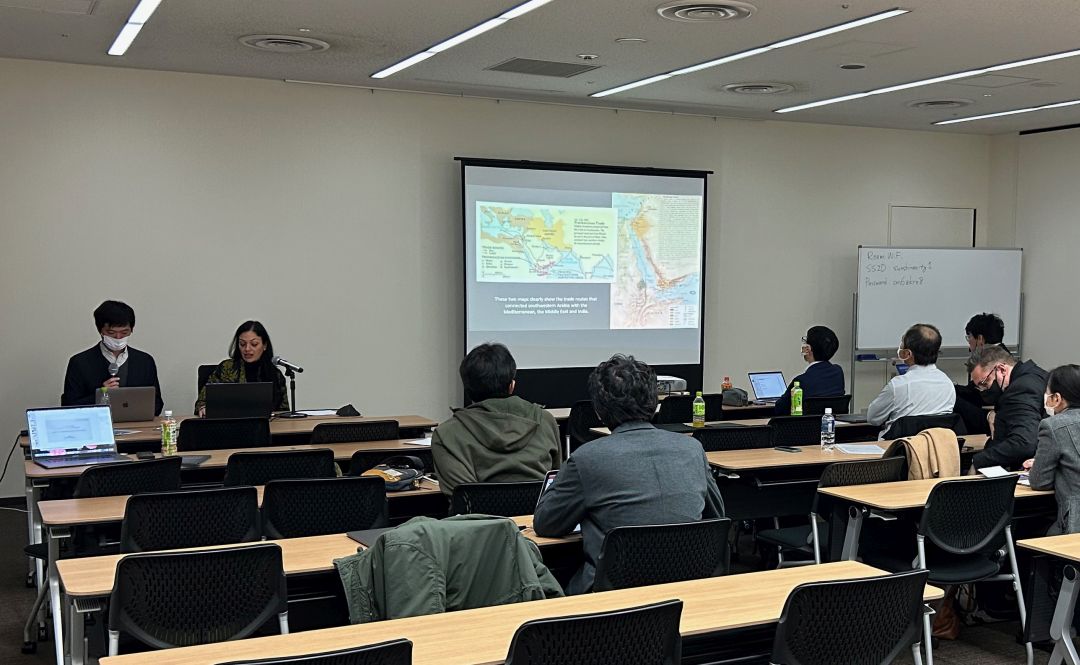Seminar of the Institute for the Study of Ancient Civilizations and Cultural Resources “Exploring the Interaction Sphere in the Civilizations of Ancient Southwest Asia”
The Institute for the Study of Ancient Civilizations and Cultural Resources held a seminar entitled “Exploring the Interaction Sphere in the Civilizations of Ancient Southwest Asia” at Conference Room 9 of the Sunshine City in Ikebukuro, Tokyo, on March 5, 2023. In this seminar, two Italian scholars invited by the Institute and three Japanese scholars presented lectures and discussions.
Dr Dennys Frenez (Adviser for the Archaeology and the Heritage Sector, Ministry of Heritage and Tourism, Sultanate of Oman) presented a lecture entitled “The Indus Civilization External Trade: Hints of a Bronze Age «Globalization» in Southwest Asia? ” exploring the interaction between the Indus Valley and the Oman Peninsula. The interaction between the two regions is represented not only by the occurrence of artefacts imported from the Indus Valley to the Oman Peninsula but also by Indus-style artefacts made of local materials, which means the complexity of the interaction.
Dr Silvia Lischi (Researcher, Pisa University) presented a lecture with the title “Along the Frankincense Road: Movement of People and Goods in Southwestern Arabia during the Iron Age”. She discussed archaeological remains from the Dhofar region in the southern part of Oman, which is one of the sources of frankincense. She demonstrated with various literary and archaeological evidence that frankincense played a great role in connecting different parts of the Arabian Peninsula and beyond.
Dr Kazuya Shimogama (Institute for Geo-Cosmology, Chiba Institute of Technology) explained the multi-directional contacts of the Mesopotamian Civilization with its surrounding regions, with the title “The Mesopotamian Civilization and its Interaction with the Surrounding Regions: Exploring the Foundation of the Civilization”. He discussed different types of archaeological evidence for understanding the interaction of Mesopotamian society and its surrounding regions, as well as literary sources of royal involvement in trading activities.
Dr Akinori Uesugi (Institute for the Study of Ancient Civilizations and Cultural Resources, Kanazawa University) presented a lecture on the multi-layered interaction network of the Indus urban society, with the title “The Indus Civilization and its Multi-scale Interaction Network”. He argued that interconnected different networks were a foundation and driving force of the emergence and development of the Indus urban society.
After the lectures, a discussion session was given moderated by Dr Yasuhisa Kondo (Research Institute for Humanity and Nature), in which discussion was made on different factors of interaction, such as urban centres, resources, prestige goods and technology, and the historical significance of interaction and trade for ancient civilizations.
The organiser would like to express his gratitude to Dr Takehiro Miki (The University Museum, The University of Tokyo) and the audience who attended the seminar.
*Seminar Program https://isac.w3.kanazawa-u.ac.jp/en/symposium/sympo20230305.html

